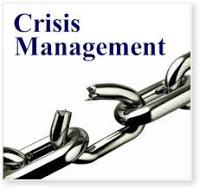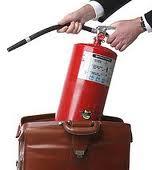
Ever heard the phrase 'There is no such thing as bad publicity'? Some say the phrase was first spoken by P.T. Barnum and it may very well have been but most believe that it was derived from a comment made by Oscar Wilde who said 'The only thing worse than being talked about is not being talked about'.
Between Freedom of Speech, and plain old poor HR judgement, there IS such thing as bad publicity and when you factor in the ability to have messages spread like wildfire across the internet, television and social media outlets, not only does bad publicity exist, it has the potential to ruin a company or brand reputation almost instantaneously. As with most things in life, there exists a few exceptions to the rule. Today we discuss the good, the bad and the ugly of dealing with what I call a Public Relations 'UH-OH' and how to come out of it alive (and with your job).
 In college during PR courses I had taken we went thru scenarios where the professor would call on you, give you a nightmarish scenario (my first one was a hospital losing power for two days) and you would have to address the classroom as if it were a room teaming with reporters and journalists hanging on your every word with only a few minutes to strategize and release a formal statement as the company spokesperson addressing the UH-OH in a way that saved company face and appeased the angry mobs lurking outside your door. (Photo Courtesy of Bryant University)
Sounds easy, right? WRONG. Very, very wrong. On the contrary, dealing with a Public Relations crisis can be one of the most challenging exercises you will experience as a marketing or PR professional and if this task is not placed in the hands of a skilled PR professional or strategic communications team, the outcome can be disastrous. Before we go into crisis management mode, I'll tell you about my first time dealing with a PR crisis...
I had been hired as the Project Specialist at Intown Manchester in July of 2007 after working for New Morning School in Bedford as a teacher's aide since college ended and careers for new marketing graduates meant going into sales positions thinly veiled under the guise of 'Marketing Specialist' titles (take note, job seekers). After a few full throttle months learning the in's and out's of Intown and its specific place within the municipal bubble in Manchester, I was feeling confident in my abilities and ready to take on new challenges... but not the one that transpired that December.
In college during PR courses I had taken we went thru scenarios where the professor would call on you, give you a nightmarish scenario (my first one was a hospital losing power for two days) and you would have to address the classroom as if it were a room teaming with reporters and journalists hanging on your every word with only a few minutes to strategize and release a formal statement as the company spokesperson addressing the UH-OH in a way that saved company face and appeased the angry mobs lurking outside your door. (Photo Courtesy of Bryant University)
Sounds easy, right? WRONG. Very, very wrong. On the contrary, dealing with a Public Relations crisis can be one of the most challenging exercises you will experience as a marketing or PR professional and if this task is not placed in the hands of a skilled PR professional or strategic communications team, the outcome can be disastrous. Before we go into crisis management mode, I'll tell you about my first time dealing with a PR crisis...
I had been hired as the Project Specialist at Intown Manchester in July of 2007 after working for New Morning School in Bedford as a teacher's aide since college ended and careers for new marketing graduates meant going into sales positions thinly veiled under the guise of 'Marketing Specialist' titles (take note, job seekers). After a few full throttle months learning the in's and out's of Intown and its specific place within the municipal bubble in Manchester, I was feeling confident in my abilities and ready to take on new challenges... but not the one that transpired that December.
The Christmas Tree Debacle

holiday season and erected at Stanton Plaza to be decorated then disposed of after the holiday cheer had subsided. Intown was in charge of decorating downtown Manchester for the holidays, so we had an interest in finding the best tree possible to decorate and light up. This particular year, my boss explained that the efforts to find someone willing to donate a tree had resulted in having a Charlie Brown-like tree to use and that other alternatives had to be sought. As the Parks Dept. also handled all the maintenance of the city cemeteries, a city employee suggested that the perfect tree had been found at Pine Grove Cemetery. Apparently, the roots of this tree had begun to interfere with an irrigation line, and would need to be removed anyways so it seemed like a win-win; Parks would be able to remove a tree that would have damaged a very expensive irrigation system while providing an enormous, lovely and very un-Charlie Brownish tree to be used for the holidays. The tree was nowhere near any grave sites and was going to cause major problems if left where it was. Seems like a no brainer, right? It would have been, had a parks employee not released photos of the Parks department removing the tree to a major statewide newspaper.
Here comes the 'UH-OH'
The paper released the photos with a grim caption of ' City Cemetery Raided for Downtown Christmas Tree'. The parks department, then run by my now husband, took their share of grief because after all, it was their department who had actually removed it BUT, the paper quoted my boss so the flood of finger pointing began pointing in our direction. WMUR's Coverage (yes, that's my husband and no, this is not how we met!)
(Video Courtesy of WMUR)

Typically, all media inquiries were handled by the Marketing Director, who served as the spokesperson for the organization but she was not in, and neither was the boss but the phone kept ringing and people were coming into the office demanding to speak with someone. Not knowing the proper protocol, I was answering calls, giving understanding and apologetic responses to concerns from the public but left the media inquiries and those from the Mayor's office, Alderman, board members and other city officials to my boss. Eventually, the information regarding exactly why this was done and a 'channel' of appropriate responses were made, and it was handled by the boss. Once a different sensational headline about something else graced the top fold of the front page, it became a distant memory with the only long-term repercussion was the parks employee being reprimanded and a promise by both involved parties to begin a broader search for a tree donor in future years much earlier and the option of planting a permanent tree in Stanton Plaza would be explored.

How to Manage a Public Relations Crisis Properly
- Put a Crisis Management Plan (CMP) into Place
- Public Safety
- Financial Loss
- Loss of Reputation

- Preparing to Respond to a PR Crisis

- Have some sort of Crisis Management Plan in place
- Practice your plan and use multiple scenarios in which it would be put into place with respective actions and responses
- Have pre-drafted static messages (templates) that can be revised to respond to any situation (a rough guide where relevant information can be added respective to the situation at hand)
- Assign a Spokesperson and make sure that person is well-trained to handle anything that is thrown at them by media, the public or even upper tier management
- Expect and prepare for fallout and create appropriate response methods

Your plan should also include methods in which you will execute your CMP (press conference, press releases, web content on your company website and social media campaigns). The Institute for Public Relations emphasizes the importance of being quick to respond with accurate information and to relay a consistent message. Having a pre-defined set of Communication Channels is vital. If it was a major UH-OH attracting a lot of media attention, the company should consider having a separate website that solely addresses the crisis and serve as a reference point when speaking directly to media (especially when caught in a tight spot). prepare for everything - for instance, you are asked a question which you are not prepared to respond to. Instead of performing PR suicide by saying 'No Comment' or 'I don't know', you can easily respond with 'That is a great question and one that is addressed on our company website at www. blah blah blah.' BP, despite the distasteful comment made by their spokesperson, did a great job at creating a crisis specific website. It's not passing the buck, it's redirecting people to a site where all concerns are addressed and are accessible to the media and public at large.
The Institute for Public Relations offers a ton of advice about handling a Public Relations crisis, including some 'Best Practices'.
This table can be found here courtesy of the IPR. Learn it, practice it and use it as a resource!
Crisis Media Training Best Practices
1. Avoid the phrase “no comment” because people think it means the organization is guilty and trying to hide something
2. Present information clearly by avoiding jargon or technical terms. Lack of clarity makes people think the organization
is purposefully being confusing in order to hide something.
3. Appear pleasant on camera by avoiding nervous habits that people interpret as deception. A spokesperson needs
to have strong eye contact,limited disfluencies such as “uhms” or “uhs”, and avoid distracting nervous gestures such
as fidgeting or pacing. Coombs (2007a) reports on research that documents how people will be perceived as deceptive
if they lack eye contact, have a lot of disfluencies,or display obvious nervous gestures.
4. Brief all potential spokespersons on the latest crisis information and the key message points the organization is
trying to convey to stakeholders.

If you are lucky, you won't need to go into reputation repair mode which can include anything from negating vicious rumors through a press conference to compensation to affected parties. If you are a larger company, a crisis manager will prepare this plan relative to the intensity and potential negative effect on the company as a whole. More on post-crisis management is available on the IPR website.
Ensuring that your company or organization is prepared for a crisis resulting from bad publicity is vital because you do not want to wait until it happens to start figuring out how to handle it. Better safe (and savvy) than sorry.
GOOD Example - Taco Bell Responds to Beef Not Being 'Real'
BAD Example - Progressive Insurance Makes a Bad Situation Worse
UGLY Example - BP's Tony Howard 'Wants His Life Back'

© themarketingmindandmatters.blogspot.com
